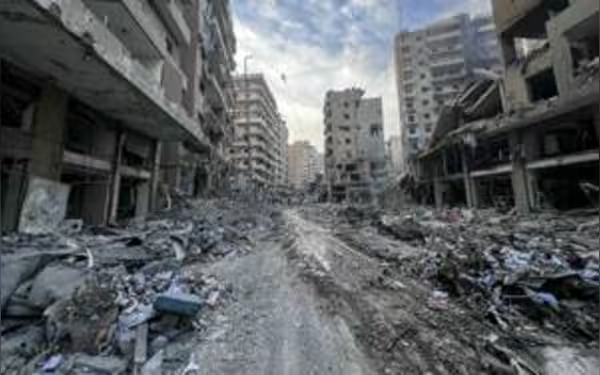Saturday, November 16, 2024 05:46 PM
Famine Threatens Northern Gaza Amid Escalating Humanitarian Crisis
- Famine imminent in northern Gaza, warns UN-backed report.
- 345,000 people could face catastrophic food insecurity by April 2025.
- Israeli military disputes report, citing biased data.
 Image Credits: nation_pk
Image Credits: nation_pkA UN-backed report warns of imminent famine in northern Gaza, with 345,000 people facing catastrophic food insecurity by April 2025.
In recent weeks, the situation in northern Gaza has escalated to alarming levels, with a United Nations-backed report indicating that famine is on the horizon. This dire assessment comes amid ongoing hostilities and a significant reduction in food aid, raising serious concerns about the humanitarian crisis unfolding in the region.
Since early October, Israeli forces have intensified their military operations in northern Gaza, an area already devastated by conflict. Evacuation orders have been issued, further complicating the delivery of essential supplies. According to the Integrated Food Security Phase Classification (IPC) report, the amount of aid entering Gaza has plummeted to its lowest levels since October 2023. The Famine Review Committee has issued a stark warning, stating that there is “an imminent and substantial likelihood of famine occurring, due to the rapidly deteriorating situation in the Gaza Strip.”
The report highlights a grim projection: by April 2025, approximately 345,000 people in Gaza, which constitutes about 16 percent of the population, could face “catastrophic” food insecurity. This classification falls under Phase 5, a stage where “starvation, death, destitution and extremely critical acute malnutrition levels are evident.” The situation has only worsened since the report was released, with food systems collapsing and humanitarian aid dwindling.
Moreover, the report indicates that critical conditions regarding water, sanitation, and hygiene are deteriorating rapidly. The committee noted, “It can therefore be assumed that starvation, malnutrition, and excess mortality due to malnutrition and disease, are rapidly increasing in these areas.” This alarming trend underscores the urgent need for intervention and support.
In response to the report, the Israeli military has questioned its credibility, claiming that previous assessments by the IPC have been “incorrect and inconsistent with the situation on the ground.” They criticized the report for relying on “partial, biased data and superficial sources with vested interests.” However, the reality on the ground suggests a different story, as access to food continues to decline sharply.
Prices for essential items have skyrocketed on the black market, with cooking gas prices soaring by 2,612 percent, diesel by 1,315 percent, and wood by 250 percent. The report emphasizes that the total collapse of livelihoods has made it nearly impossible for families to purchase or barter for food and other basic necessities.
Adding to the complexity of the situation, Israel severed ties with the UN aid agency for Palestinians (UNRWA) last month, raising alarms about the “extremely serious consequences for humanitarian operations” in Gaza. The United States, a key ally of Israel, has set a deadline of November 13 for improvements in the humanitarian situation, warning that failure to do so could result in the withholding of some military assistance.
The looming famine in northern Gaza is not just a statistic; it represents the lives of countless individuals and families facing unimaginable hardships. As the international community watches closely, it is crucial to advocate for humanitarian access and support for those in desperate need. The situation calls for urgent action and a collective response to prevent a humanitarian disaster that could have far-reaching consequences.













